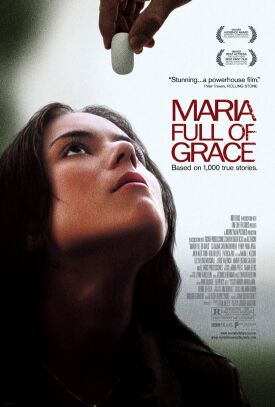Ponette
Ponette by Jacques Doillon is a tribute to the precocious brilliance of the child actress, Victoire Thivisol, and presumably to Doillon himself for directing her and the other remarkable children — Matiaz Bureau, Delphine Schilz and Leopoldine Serre — who take up most of the screen time here. The film is worth seeing just for these performances, although it suffers from leading us up to what is perhaps an unavoidable dramatic dead end.
The basic premiss is that little (approximately) six year old Ponette’s mother (Marie Trintignant) dies in a car crash, and we are privileged to overhear, as it were, the child’s attempts to cope with her grief with such help as is available from her Christian aunt, Claire (Claire Nebout), her atheist father (Xavier Beauvois) and her alternately credulous and skeptical coevals. It is a good idea insofar as it presents us with an essential truth about grief, which is that, in its grip, we are all hysterical six year olds, willing to make any deal with the almighty or the forces of darkness to get life back the way it was. The trouble is that, once you have said that, there is really nothing more to say.
In other words with adults, or those who retain at least the façade of maturity and self-control, some dramatic resolution is possible; children have to go on, more or less, being uncomprehending children. Doillon’s solution to this problem, not a very satisfactory one, is to bring mommy back from the dead for ten minutes or so at the end of the film to comfort and reassure her daughter and tell her “to learn to be happy”—after which the child is presented as being, if not happy, at least on the road to happiness again. It looks too forced and artificial a resolution, but it is perhaps the only possible thing to do with this little heroine after wringing out our hearts over her for the previous hour and a half.
I also found myself occasionally growing impatient with the patness of the scripted childish profundities, even though there is no arguing with the fact that they are often genuinely profound. One of my favorites comes as Ponette is arguing with her skeptical cousin, Matiaz (Master Bureau), who explains to her that being dead means never coming back. “Only zombies can come back,” he tells her. Everyone else is buried forever, and “they put a heavy cross on you to keep you down there, and you stay like this, like a statue.” Later he tells Ponette again that “Dead people never come back.”
“Jesus did,” says Ponette, who has just been given a version of the Christian orthodoxy about the resurrection by Aunt Claire (Matiaz’s mother). Matiaz counters by a more direct appeal to experience: his grandfather died and, unlike Jesus, did not come back. “That’s because no one was waiting for him,” says Ponette.
Also movingly portrayed is the temptation of Ada (Miss Serre), who purports to have special knowledge of supernatural things and, in fact, to be “a child of God” because she has undergone “many trials” — which consist of children’s dares — jumping off a high wall or other scary things. Ada tells Ponette that “if you are a child of God, you have power over God” and can make Him do what you want. Ada, later assisted by Matiaz and Delphine (Miss Schiltz), devise “trials” for Ponette, who is naturally eager to become a child of God herself. One of these consists of putting her in a dumpster alone for, supposedly, five minutes. Touchingly, when she begins howling immediately, Delphine goes back, lets her out and tells her that her five minutes are up and she has performed successfully.
This is not the only moment in the film which more than makes up for the occasional false note — as when mommy explains that “You can die, but die alive. . .” This message sounds to me suspiciously grown-up, albeit Hollywoodish grown-up, especially after mom goes on to say — to a six year old! — ”try everything.” Well, maybe not everything, darling. But you have tried quite enough to fill our hearts for one day.
Discover more from James Bowman
Subscribe to get the latest posts to your email.








